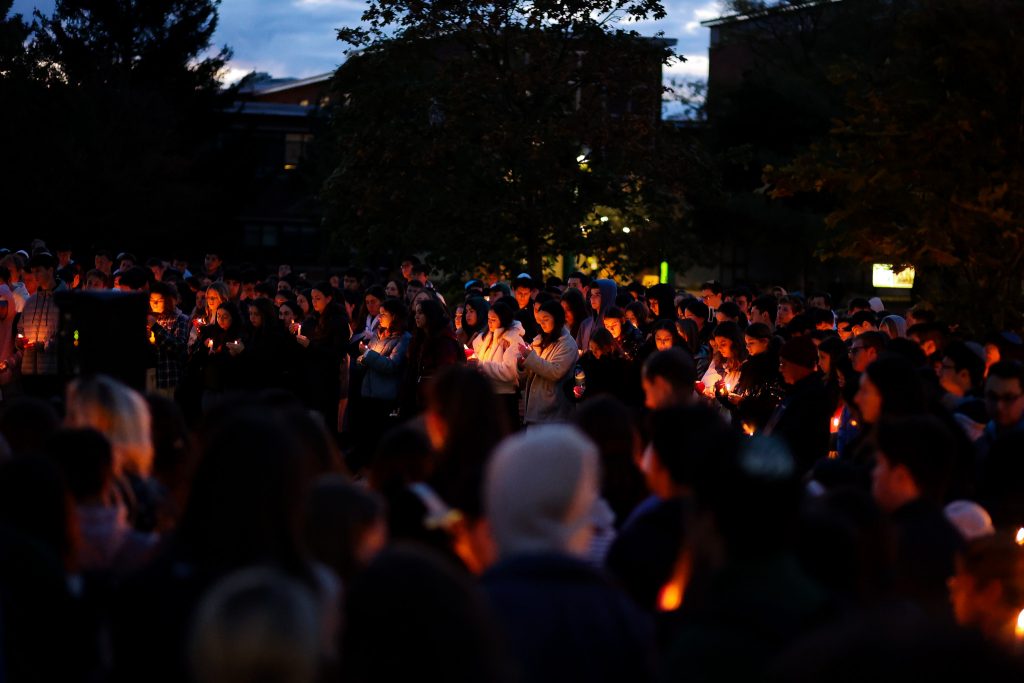Students gathered on the Peace Quad Monday night to “Unite Against Terror” at a vigil organized by Binghamton University’s Jewish community amid ongoing violence in Israel.
Spearheaded by the BU Zionist Organization (BUZO), Hillel at Binghamton, Orthodox Union-Jewish Learning Initiative on Campus (JLIC) and Chabad, the vigil provided a space for students to stand in solidarity with Israeli victims amid a large cross-border attack launched by Hamas, a militant group in the Gaza Strip. Saul Hakim, BUZO’s president and a junior double-majoring in Judaic studies and political science, described the event as a “joint effort” and credited its success to the entire Jewish community on campus.
Participants lit candles and put their arms around one another, as leaders from multiple organizations recited prayers and led the crowd in song.
On Sunday, Israel declared war on Hamas after a surprise attack by over 1,000 militants on Saturday. Ben Menora, the rabbi at the JLIC, the orthodox affiliate of Hillel, is a reservist member of the Israel Defense Forces (IDF) and was called to fight.
Hakim described BUZO as a platform for the voices and emotions of Jewish students at the University, who are “deeply” connected to the ongoing attacks in Israel.
“Many of them have family members or friends who are either there on the frontlines, even some that are missing or were unfortunately killed in the terror attacks,” Hakim said. “They’re feeling this enormous sense of grief. I think what we are really aiming to do is channel that into something greater than only one person.”
Rabbi Aaron Slonim, who also serves as the executive director of the Rohr Chabad Center for Jewish Student Life, began the vigil by inviting attendees to stand and pray with their “brothers and sisters in [the land of] Israel.” As he denounced the violence in the country, cards were distributed with the names of the over-900 victims at the time.
As of 5:20 p.m. on Oct. 11, over 1,200 people in Israel have been killed, according to the New York Times, with over 150 abducted by Hamas. Israel has responded with airstrikes in Gaza, with local officials reporting at least 1,100 killed. This is a developing situation. For more information, visit New York Times live updates.
Slonim expressed pride in his students’ “remarkable resilience” during this time, and expressed how hard this situation has been.
“This is a dreadfully difficult time for the Jewish community and indeed, all people concerned for democracy and decency worldwide,” Slonim wrote in an email. “We, who are not in Israel to defend our land and its people, must do what we can do from here. Jewish history is marked by persecution and adversity, but we have always come out stronger for it, and we will do so very soon, please God, again. In the interim, standing together, united in the face of evil and steadfast in our acts of goodness and kindness will give us the strength to get through this terrible time.”
Students spoke about how they have been impacted by the attack. They told stories about their families, those who died, those crowded in bunkers or bomb shelters and loved ones still in danger.
Mia Raskin, one of the organizers and a first-year graduate student studying business administration, discussed her thoughts on the violence in the region and the response from the Jewish community.
“Our brothers and sisters were ambushed on Friday night and Saturday morning during a Jewish holiday,” Raskin said. “The beautiful thing about the Jewish people is that when bad things happen to us, we don’t immediately turn to violence or attack… We come together and we sing and we pray together.”
Vigil participants sang “Im Eshkachech,” a song that emphasizes the importance of Jerusalem to the Jewish people — a critical part of the Jewish identity, according to Hakim. They also sang “Acheinu,” which expresses that all Jewish people are brothers.
In a statement, the student board of Hillel expressed hope that the vigil would show the Jewish community that they are not alone and that there is a campus-wide network of support available for them.
“While we are saddened by the purpose for holding this vigil, the support and love we have felt has been immeasurable, and we hope that the wider community feels this as well,” the statement reads. “We are sending our thoughts and prayers to all those impacted by this tragedy and are extending our strength to all those that need it.”
At their Tuesday night meeting, BU’s Student Association (SA) Congress passed a “Resolution Reaffirming SA Commitment to Combating [antisemitism],” as a result of feelings of “unease and fear” among the Jewish organizations on campus. Hakim encouraged non-Jewish students to be allies.
“I was proud of our Jewish student leaders for bringing the campus together to demonstrate that wherever we stand on political issues, we stand united against terrorism,” Ira Glasser, the CEO of Hillel at Binghamton wrote in an email.
Emily Lillian, the Israel fellow for Hillel, arrived at BU about two weeks ago. In a speech at the vigil, she expressed grief at the “unimaginable disaster” in Israel.
“I am asked several times, ‘how is my family doing?’” Lillian said. “I don’t have the answer because Israel is my family.”



